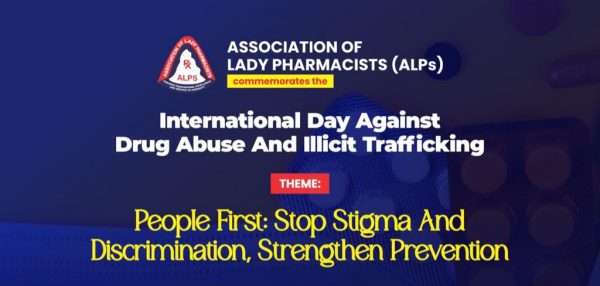
As the global community commemorates International Day against Drug Abuse and Illicit Trafficking 2023, the Association of Lady Pharmacists (ALPs) National, has admonished parents on the need to spend quality time with their children, an action that will aid early detection of drug and substance abuse symptoms in the youngsters.
The female pharmacists made the call in a webinar held Monday, to mark the International Day against Drug Abuse and Illicit Trafficking 2023.
They have also warned parents to desist from denying what their children are into without spending time to thoroughly investigate their wards’ daily routine to establish the fact. This is in correlation with a report by the United Nations Office on Drug and Crime in Nigeria, which indicates that 14.4 per cent (14.3 million) of people aged between 15 and 64 years abuse drugs.
The International Day against Drug Abuse and Illicit Trafficking, or World Drug Day, is marked on 26 June every year to strengthen action and cooperation in achieving a world free of drug abuse.
The aim of this year’s campaign, according to the United Nations Office on Drug and Crime, is to raise awareness about the importance of treating people who use drugs with respect and empathy; providing evidence-based, voluntary services for all; offering alternatives to punishment; prioritising prevention; and leading with compassion. The campaign also aims to combat stigma and discrimination against people who use drugs by promoting language and attitudes that are respectful and non-judgmental.
The UN Secretary-General, António Guterres, in his message for this year’s celebration, with the theme “People first: Stop stigma, and discrimination, strengthen prevention”, decried the prevalence of drug abuse and its impacts on peoples’ health, saying tens of millions of people suffer from drug-use disorders, with less than one-fifth having access to treatment. Drug users are doubly victimised, he said, first by the harmful effects of the drugs themselves, and second by the stigma and discrimination they face.
He thus called for the implementation of drug abuse policies in order to crack down on traffickers and re-allocating resources to prevention, treatment and harm-reduction measures.
Speaking on strengthening prevention strategies on drug abuse during the webinar, ALPs National Chairman, Pharm. (Dr) Scholastica Lan, stressed the importance of the home front for early detection of drug abuse symptoms, which requires parents’ deliberate engagement with their youths at home.
She said” Strengthening prevention of drug abuse has a lot of strategies, as it starts from the home, then schools and the larger society. It also demands parents to stop living in denial of their children’s activities, as this emboldens the children in this act.
“Parents should spend time with their children, because this will enhance easy identification of the child whether he or she is an addict or not. Parents can also search their children’s personal effects as security checks to keep them on their toes”
Lan, who acknowledged that it is easy to identify an addict, mentioned some of the signs of drug abuse in children including, bulging eye balls, bullying of siblings, flagrant disregard for parents, late night keeping, among others.
Other members of the panel, who spoke at the webinar are Dr Vincent Udenze, a consultant psychiatrist, MD/CEO of Intersect Consortium; Dr Monica Eimunjeze, technical adviser, ALPs; Pharm. (Mrs) Victoria Ukwu, immediate past chairman, ALPs; and Pharm. Chinwe Effiong, mental health pharmacist, and moderator of the programme.
In his contribution, Dr Udenze, warned mothers to desist from being enablers of wrong behaviours in children, while admitting that it is possible to get addicts back on track after treatment. He also charged ALPs on formulating policies to prevent the dispensing of regulated drugs to youths in their various pharmacies.
“We must understand that when people have treatment, they get better, while some relapse. However, several factors can lead to relapse, depending on what led to the addiction, for instance, rape. Again, when it comes to treatment and relapse, it is an individualistic thing” he explained.
The discussants reiterated their commitment to continue with the various campaigns to create awareness and also demand that pharmacists practice within regulations.











